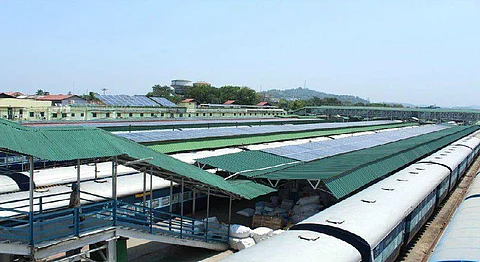
- HOMEGROWN WORLD
- #HGCREATORS
- #HGEXPLORE
- #HGVOICES
- #HGSHOP
- CAREERS
- ABOUT US
- CONTACT US

India is, slowly but surely, becoming increasingly aware of its solar power capacity. In three years, from 2014 to 2017, the country has quadrupled its solar-generation capacity. Taking a giant leap forward in this direction, the Indian Railways’ Guwahati station has become the first station in North-East India to run completely on solar power.
This first-its-kind project was commissioned by the Indian Railways in 2017 for INR 6.7 Crore. It has been funded by a container company called CONCOR and the 700 KWp grid interactive solar power plant was installed by Sahibabad’s Central Electronics Ltd. Quoting Pranav Jyoti Sharma, CPRO of North-East Frontier Railway, the Financial Express reported, “The Guwahati railway station runs 100% on solar power. This is a first of its kind initiative for the North-East and has proved to be immensely beneficial.”
The positive effects of this project are going to be plenty. Not only will it reduce the emission of carbon dioxide, but will also severely cut down on electricity cost. According to the report, the total saving of electricity costs on account of the solar plant is Rs 67 lakh. Looks like Indian Railways has really taken it upon itself to pave a way for a greener future. It reportedly aims to procure 1000 MV of solar power in the next five years. Just last year, India’s First Solar-Powered Train was launched. The solar DEMU (Diesel Electrical Multiple Unit) trains, from Sarai Rohilla in Delhi to Farrukhnagar in Gurgaon, was an important achievement towards a more sustainable India. The station in Guwahati is the next step – greatly reducing the railway sector’s dependence on fossil fuels and aiding in India’s cleaner development.
Feature Image Credit — The Financial Express Online
For more images and details, read the full report in The Financial Express Online here.
If you enjoyed reading this article, we suggest you read:
